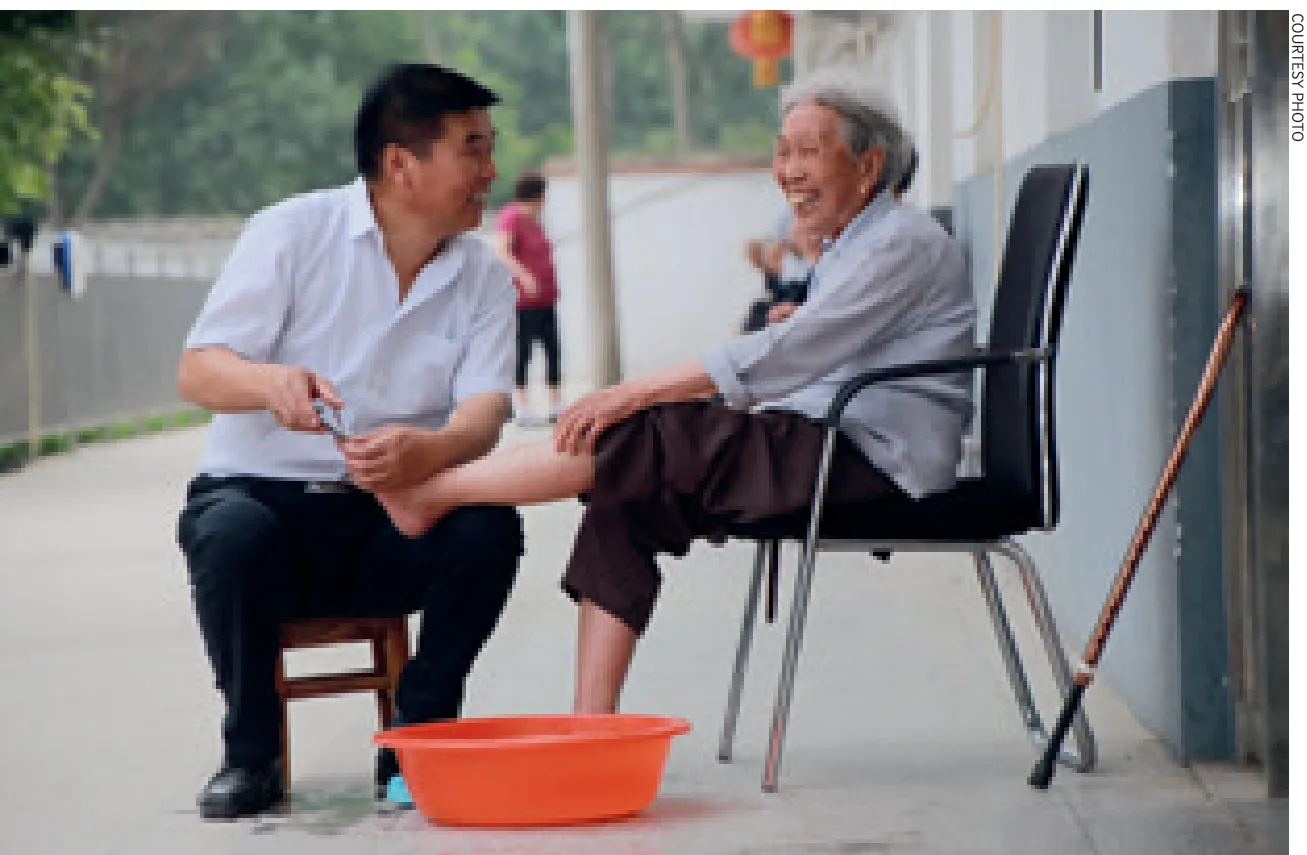Life’s Work
2022-11-09nursinghomeheadandhis36yearsofdedicatedserviceByZhangShasha
A nursing home head and his 36 years of dedicated service By Zhang Shasha
Li Yinjiang was uncharacteristically silent as he wolfed down his dinner. His father noticed his low spirits and guessed something must have happened. After minutes of pause and pondering, Li finally gave vent to his father: “I can’t figure out why they made this decision.”
It was a day in 1986. The 29-year-old was then secretary of the Communist Party of China (CPC)branch of a village in Xuyi County, Jiangsu Province, a position he deemed perfectly suitable for young people to participate in the management of local affairs and improve themselves. However, the higher-level Party organization had just that afternoon transferred him to another post—the head of a yet-to-be-built nursing home in Xuyi’s Guiwu Town. “Dealing with the matters of senior people doesn’t sound very promising,” Li said.
“Do you still remember the obligations of a Party member?” the senior Li asked in reply. “A Party member should comply with Party decisions on job allocation, and readily undertake the Party’s tasks.”
Li did, of course, assume the new role and the past 36 years have proven worthwhile.
Heart of kindness
The story of the nursing home began with a 2,800-square-meter piece of waste land in Guiwu.The local government planned to build the nursing home there to house senior people who were incapable of work, had no source of livelihood or lived alone.
On the day Li took up his new position, not one single brick had been laid at the site and the ground remained unbroken. With a limited budget, he employed fewer than 10 workers and labored together alongside them to complete the project. In only 90 days, the 11-room nursing home was finished, later becoming home to seven elderly people.
With no idea of what a nursing home was, the first“guests” were hesitant to “check in” to their new home.They presented Li with two conditions on which they would consent to move in: “We will count on you from now on and you cannot leave us halfway and, as we have no children, you must deal with our funerals after we pass away.”
In 1987, one of the home’s residents passed away, and the other six fixed their eyes on how Li would fulfill his promise. Li made careful and deliberate arrangements for the funeral that upheld the local traditions. For the first time in his life, and from then on, he walked the talk of taking good care of every single person in the nursing home wholeheartedly. To date, he has arranged 78 such funerals.
So far, the home has cared for roughly 200 senior people. The residents’ stories vary from one another, but “each of them impressed me equally,” Li toldBeijing Review.
Li said he had been encouraged by a resident who, when other people exclaimed over his “bitter” life of having no family to rely on, replied, “You should be happy for me. Here, I’m living a happier life than ever before.”
Li has always regarded the residents as his family members. He told them he would be available for them around the clock and he has been there for them for 36 years. Once upon a time, at the funeral of one of the residents, the man’s sons and daughters knelt down before Li to express their gratitude for the care he showed their father.
Having reached the pension age five years ago, Li and his wife moved to the nursing home and he continues taking care of the residents as a volunteer. “It’s better to say I rely on them more than they rely on me,” he said.
Silver businesses
The floor area of the nursing home is now nearly 20 times larger than that of the original Li built in 1986. The expansion is the result of Li’s efforts to develop nursing-home-based businesses, to increase income sources.
With his past experience of arranging funerals, Li began offering funeral services to the public 2003. The nursing home has also opened extra beds under a commercial program. Seniors from neighboring provinces now seek to become residents, attracted by the level of service. A place at the home costs 600-800 yuan ($82-110) per month,which is just one third of the market price.

Li Yinjiang trims the nails of a resident in 2018

Li helps one of the residents collect cucumbers in 2021
The two ventures together bring in 150,000-200,000 yuan ($20,640-27,520) per year for the nursing home, which is used to improve the facilities. The home requires fewer subsidies from the government, Li said.
The nursing home is now equipped with a movie theater, a chess room and an activity center. Moreover, the backyard is available for the residents to plant vegetables, which are purchased by the nursing home at the market price so the growers can earn some pocket money. For those who are good with their hands, Li contacts local factories to ask for some component assembling work.
“Unlike the city dwellers, who prefer dancing and singing after retirement, seniors in villages cannot let go of their emotional connection to the soil and prefer to plant flowers and vegetables,” Li said.
He also established a resident self-management organization. Members make decisions on what should be included on the menu and what daily necessities should be purchased.
“They know everything about the nursing home, big and small, such as where the government funds have gone and how the daily supplies were distributed,” Li said. “We should not treat elderly people as though they’re incapable. Instead, we give full play to their wisdom and experience and let them be an integral part of the management process by participating, decision-making and supervision, and then enjoying the happiness of being the masters of the nursing home.”
In addition, Li has also acted as a matchmaker for nine couples who have met and married at the home. “Seniors in villages are changing their minds. They no longer regard the nursing home as a hospice for those without kids or who are abandoned by family, but rather a place to enjoy services and meet people,” Li said.
According to the National Health Commission, by the end of 2021, the number of China’s elderly people aged 60 and above had surpassed 267 million,accounting for 18.9 percent of the population. The aging population has become a pressing issue in China.
In October, Li attended the 20th CPC National Congress in Beijing together with more than 2,200 other delegates elected to represent the Party’s more than 96 million members. Five years ago, he was also a delegate to the 19th CPC National Congress.
The report to the 20th CPC National Congress says the Party will pursue a proactive national strategy in response to population aging, develop elderly care programs and services, and provide better services for elderly people who live alone. “By doing so, we can ensure that basic elderly care is accessible to the entire elderly population,” it states.
In addition to further improving the environment and services of his nursing home, Li plans more explorations in developing home-based care for the elderly and creating senior-friendly communities. He has already put his ideas in place in a community in Guiwu,where seniors can stay at home and order services to their doors, including purchasing, home appliance maintenance and medical care.
However, Li also has his concerns as younger generations are still unwilling to take up careers related to senior people because they prefer to earn better money in urban areas. Li is still looking for his successors and hopes to pass on his experience to young people. BR
